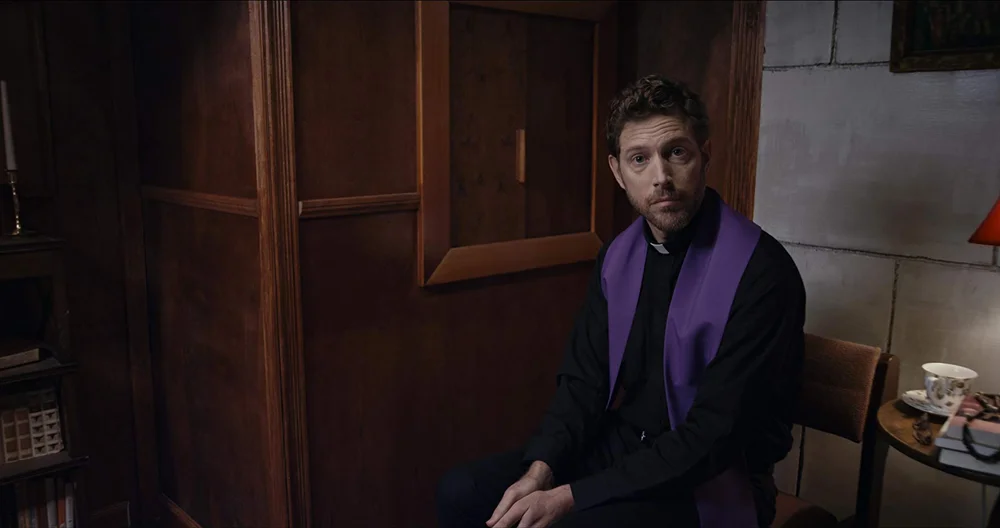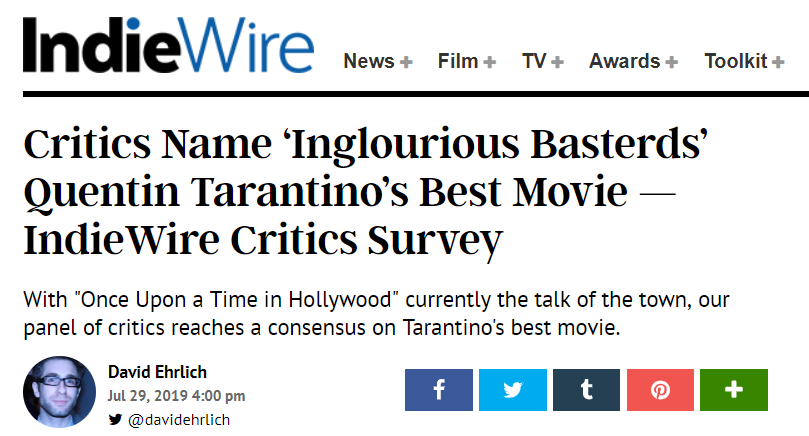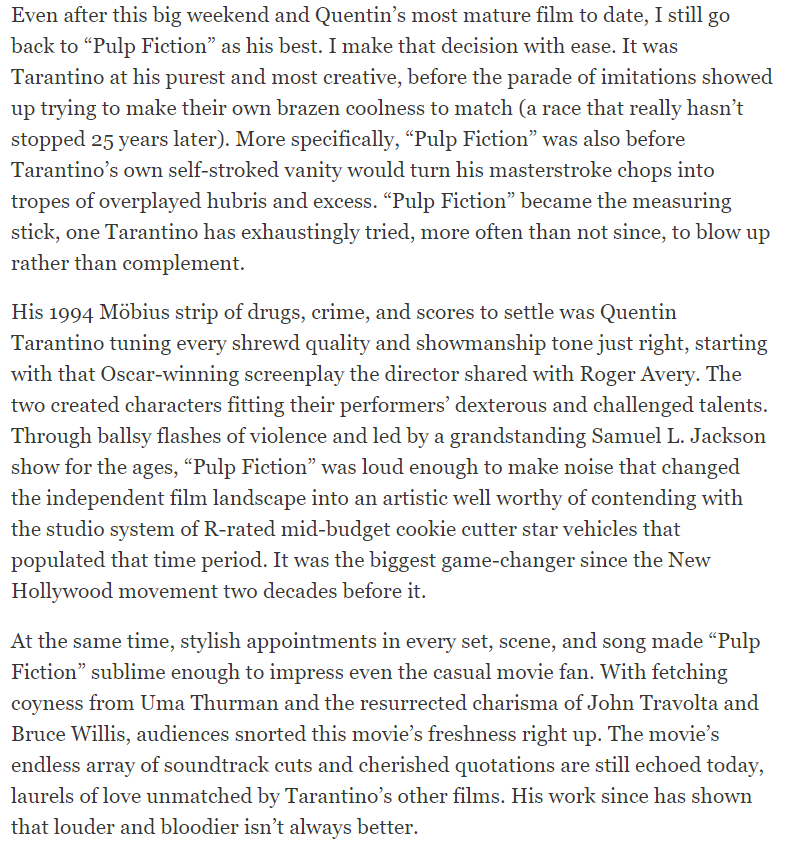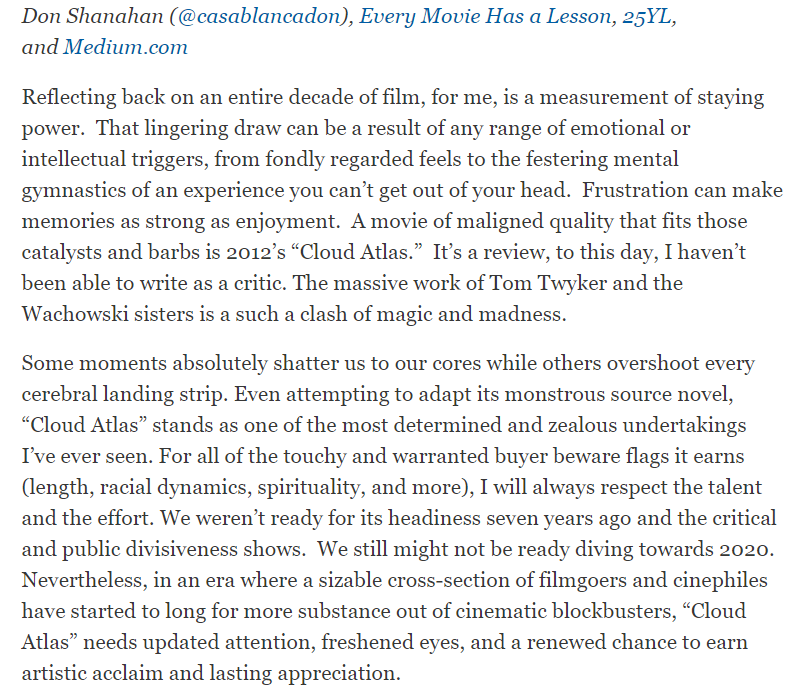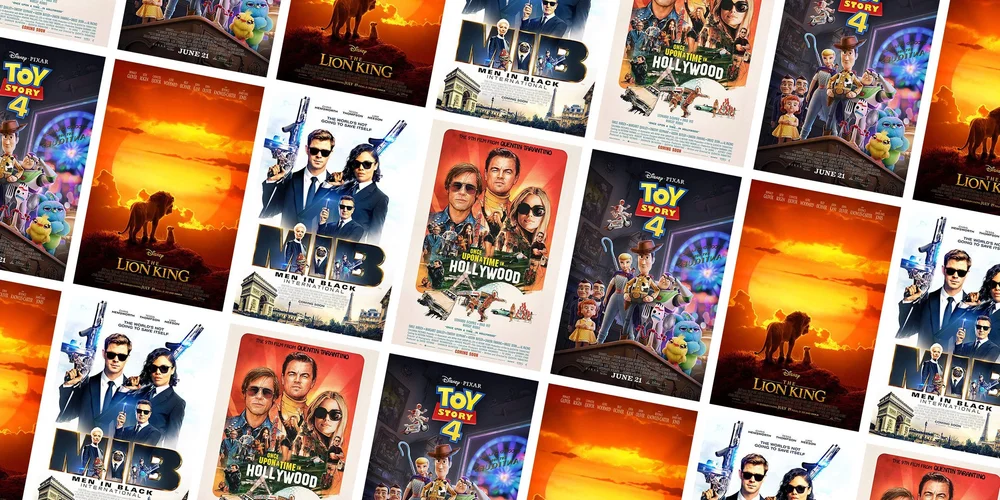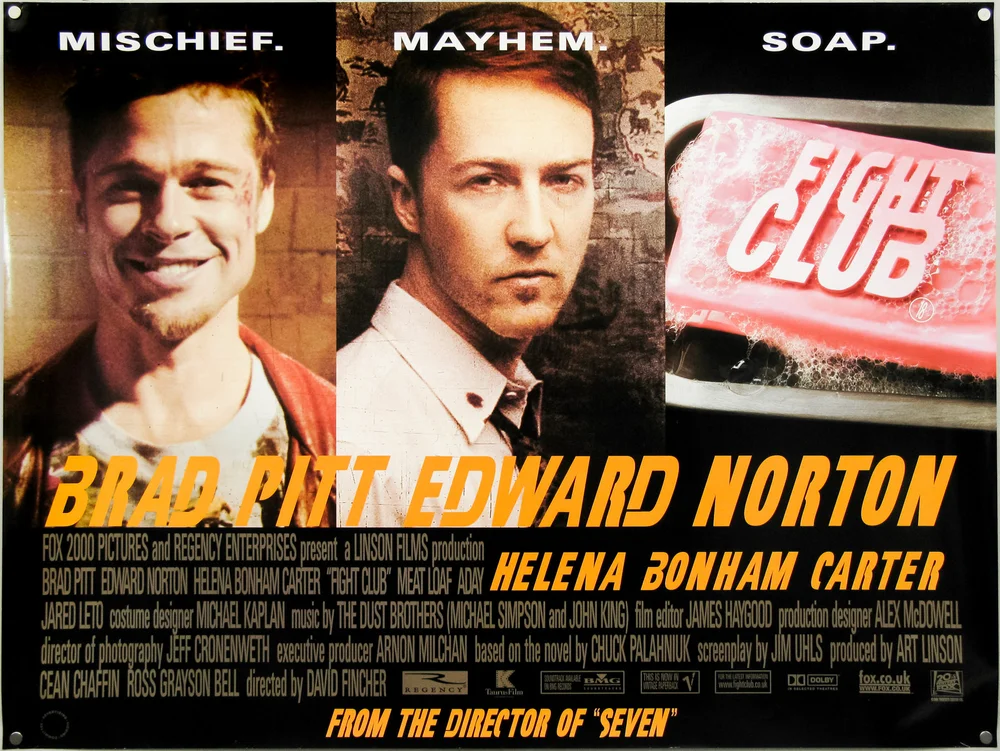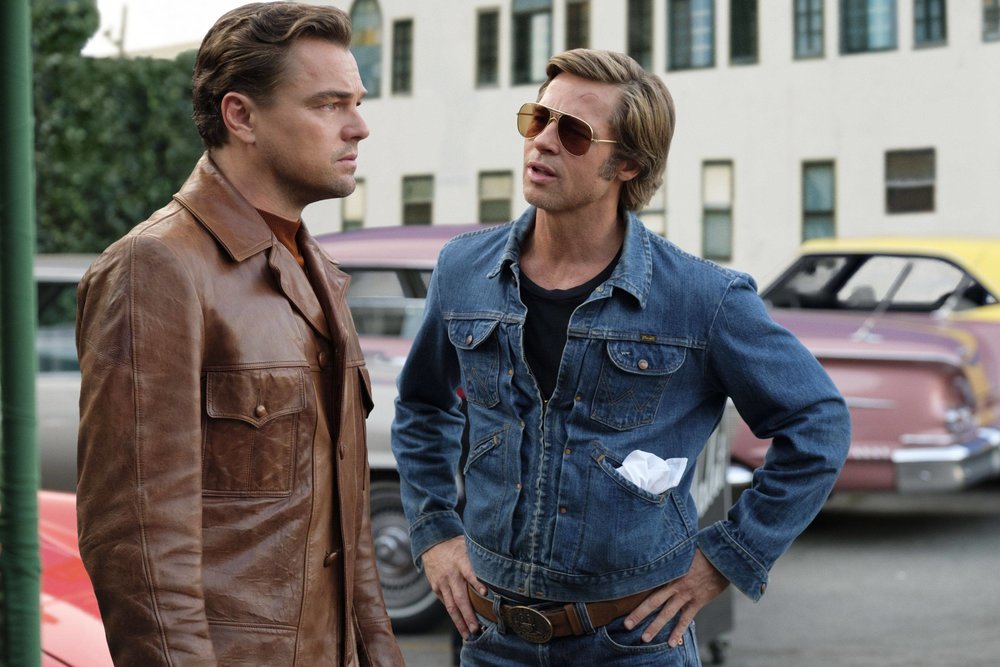
(Image courtesy of Sony Pictures via EPK.tv)
ONCE UPON A TIME… IN HOLLYWOOD— 3 STARS
One of the noun variations of the Merriam-Webster Dictionary’s definition for “fairy tale” reads “a story in which improbable events lead to a happy ending.” Another explains “a made-up story usually designed to mislead.” Sprinkle in the term’s use as an adjective with the descriptor of something “especially marked by seemingly unreal beauty, perfection, luck, or happiness” and you get the drift. One could argue that every single Quentin Tarantino movie is, from various bandits getting away with their crimes to Adolf Hitler getting Tommy-gunned to the face and every pervasive twist in between, essentially a spectacular fairy tale, just more crass, extreme, and violent than the variety we put in front of kids.
Slapping a “once upon a time…” to the title of his ninth film, Tarantino makes that label and its yarn of unlikelihood, misdirection, and heightened allure an upfront certainty. Following that classical starter with his chosen target of story setting, the director’s usual approach of homage becomes readily apparent. Making so many fairy tales with a fat creative license to revise whatever he wants, fancy, zeal, and style are never Quentin Tarantino’s problems. The tightness of his brand of chatty and meandering excessiveness is usually the hangup. This movie has some of the best of the former and still plenty of the latter for a dippy mix of sunny sauntering and tiresome puzzlement. Chicago’s Music Box Theatre is one of the handful of exclusive venues in the country to have this in true 70mm.
The scene is the City of Angels in February of 1969 during the rise of dingy flower power fadness clashing with the waning glitter of Old Hollywood. Actor Rick Dalton (Oscar winner Leonardo DiCaprio) has seen his stardom fade in the last decade from gracing movie marquees as a leading man down to the second tier market of television. His second wind of glory, starring as the western hero on the long-running successful show Bounty Law, has come and gone. Now, unwilling to really change, Rick is chasing typecast guest star spots as villainous heavies during pilot season on shows like The F.B.I. and Lancer for nutty directors like Sam Wanamaker (long-lost original Spider-Man Nicholas Hammond).
LESSON #1: THE FEELINGS OF USELESSNESS — Career decline is a clear catalyst for this lesson. The slow drain of shrinking work has Rick beginning to believe if he’s not even a good actor anymore. His talent is completely still operative. It’s the perception that eats him up with fear and anxiety. During this time period, television was an insult and looked down upon as lower work, very unlike today. A profitable offer to go to Rome and lead spaghetti westerns from ritzy producer Marvin Schwarz (a richly smarmy Al Pacino) is not quite enough to lift spirits either.
Rick’s ever-present squire is his longtime stunt double Clint Booth (fellow Oscar winner Brad Pitt), a chiseled specimen of fervent loyalty and relaxed firmness. He’s the kind of man who could knock Bruce Lee (Mike Moh of Empire and Inhumans) on his ass because he can on a dare while doting on his pet pit bull with kisses and hugs at the end of a day’s work. The beaming Booth does all the domestic measures to tie Rick Dalton’s shoes, so to speak, from handyman housework to chauffeur services. Their fates are tied, which means Clint’s spark has its flickering failings as well as he crashes in a rusty trailer outside the old Van Nuys Drive-In.
Orbiting alongside their cigarette-ashen decline is the foil of the bright rising stardom of Sharon Tate (Margot Robbie), the model-turned-actress wife of filmmaker Roman Polanski (Rafał Zawierucha) coming off The Valley of the Dolls. The newlyweds just so happen to be Rick’s new neighbors on his Hollywood Hills cul-de-sac of Cielo Drive. The foreboding attention Tate garners from Charles Manson (TV vet Damon Herriman) and his freakish flock of lip-biting jailbait followers (notably including Margaret Qualley of The Nice Guys, Dakota Fanning, Lena Dunham, the future Elvis Presley Austin Butler, and others) looms and intersects with the dalliances of Rick and Clint by the time the fateful night of August 9th rolls around on the calendar.
The dichotomy of dread and luster peaks in a dynamite scene where the beautiful ingenue flavor-of-the-moment strolls through Tinseltown with carefree smiles while the self-anointed has-been drowns sorrows feeling inferior. Before a tirade of hating his lines and trashing his trailer later, Rick is chatting up his eight-year-old Method co-star (American Housewife kiddo Julia Butters) between scenes about the paperback western book he’s reading to pass time. When asked to describe it to the kid, Rick realizes its plot is a downright mythic match to how he sees his own career, which reduces the senior actor to a blubbering mess. Played brilliantly parallel to this scene is watching Sharon Tate kick her feet up at a daytime matinee to watch herself in the Dean Martin vehicle The Wrecking Crew. She cannot help but grin with enjoyment and accomplishment for knowing that she has entertained a captive audience in her own way. In their contrast, the dueling sequences show exactly the crossroads of the time period the notorious filmmaker is lovingly capturing.
Do this critic a favor. If you read one pretentious person bitching about the so-called “fan service” of a popcorn Star Wars movie in one place while praising the throwback accuracy, endless references, and the buffet of cultural callbacks of this or other Tarantino movies, punch them in the face for being a hypocrite (or write them a mean tweet, either one). Once Upon a Time… In Hollywood has massive nostalgia for fan service aimed a different generation at quadruple the rate of the younger genre fare those cinephiles frown upon. Geeky, blatant homage has always been the part of the hodgepodge of Tarantino. It’s an expected calling card, a borrowed ladder, and part of what makes him brilliant. If it’s standing ovation praiseworthy for an so-called auteur like Quentin, then it should be for other filmmakers.
LESSON #2: 1969 WAS A HELL OF A TIME TO BE ALIVE — With that rant in mind, Once Upon a Time… In Hollywood is a blast of a picturesque party life postcard to inhabit for nearly three hours. The production design work of Barbara Ling (Batman & Robin, Falling Down) to bleed into the neon-soaked vintage location scouting from supervisor Richard Schuler (A Star is Born, Her) and his team is richly creative and extraordinary. Subtle visual effects from veteran artist and two-time Oscar winner John Dykstra (Star Wars, Spider-Man 2) blur the edges to put the people of the present seamlessly into the past when necessary. The stellar costume work from frequent Tom Ford collaborator and Kingsman series designer Arianne Phillips has the right blend of gaudy and gritty. Fittingly, Tarantino’s longtime music supervisor Mary Ramos has assembled a bottomless pit of deep cuts and cool tracks for an outstanding soundtrack album in an underscore-free film. This is more than a love letter for the pivotal year. It’s an entire wing of a modern culture museum. Soak it in.
Honestly, get some sunblock because almost too much often counts as strutting fluff. There’s a good chance 25% of this movie is driving around or lounging to the background entertainment of the era while mundanity happens on-screen. As kitschy and peppy as it all may be to give the actors chances to shoot the sh-t and cruise around doing their own driving, when the most amusing element of tone for much of the entire movie is the diegetic radio and television advertisements in scenes of pause and transition, you’re doing a few things right and a few things wrong. On the plus side, your sumptuous details of style and production value flourishes provoke multiple senses of attention and engagement. On the negative side, you must not be doing much interesting with your characters if that replaces people as often as it does.
LESSON #3: FRIENDSHIP GOES BOTH WAYS — There is a supremely interesting core in Once Upon a Time… In Hollywood comprised of the professional relationship and tight kinship between Rick Dalton and Clint Booth. Together, they’re a hoot. Both really look out for each other despite their different castes and picadillos. The sheer talent creating these instantly engaging characters is off the charts.
Leonardo DiCaprio’s wacky acting to portray a volatile overactor is pitch-perfect and very often hilarious on his own. He remains in his expressive and wrought wheelhouse. Make no mistake, though, Brad Pitt is the swooning heartbeat of this movie and climbs the storied charts of the director’s best and coolest movie tough guys, a QT specialty. Pitt stirs all the drinks, pokes all the bears, fills every frame, and steals all the scenes every chance he gets in his most liberated performance work in years. Aging like fine wine, meet your new Best Supporting Actor Oscar favorite.
Had the film used all its energy to tell this compadre story with all the shine and sheen of the setting with a mere tickle or two of the background history nearby, Once Upon a Time… In Hollywood would be a tighter and more effective film. As knockout as she gaze upon, Margot Robbie is given criminally little to do with her sizable talent. Further, the revisionist history of her exterior inclusion and the acid-fueled ending feels unnecessary when you have Leo and Brad scoring in unison this solidly on the dour messages of changing times and career crossroads. Yes, this is Quentin Tarantino’s flair for fetish and his free-swinging eccentricity for rank parody, but it is also why he still sorely needs an editor at the table read and screenplay desk. This isn’t a complete clunky slog, but there’s plenty of fat to trim on this prime cut of meat. Luckily, two swinging dick Hollywood studs make it strong.

LOGO DESIGNED BY MEENTS ILLUSTRATED (#809)
Permalink
from REVIEW BLOG - Every Movie Has a Lesson https://ift.tt/32ON4T8
